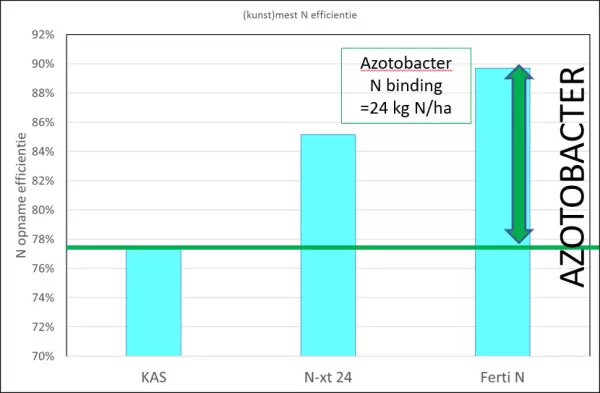
Ferti-N
The product Ferti-N contains the Azotobacter chroococcum, an N-fixing bacterium that occurs naturally in Dutch soils. In fact, this bacterium was first discovered in the Achterhoek area! It is therefore a native species. This means that this organism occurs naturally here. A microbe grows and develops best in such conditions. Its effect is comparable to that of other N fixers. However, a major difference in comparison with nitrogen fixers in leguminous plants is that this organism does not have a specific host plant with which it lives in symbiosis, but moves freely in the soil. What is important for this bacterium is the presence of structure in the soil, which will help it function at its best and remain active.
The bacterium depends on root exudates for its food, and therefore benefits from abundant root activity. It also provides for itself by secreting Auxin and stimulating the plant’s active root development. Of course this works best when the conditions are good, which means no excess N available, a good soil structure, adequate humidity and the presence of sufficient exudates. What many people may not know is that Mo (molybdenum), Fe (iron) or Va (vanadium) must be present. When the soil temperature is more than 7 degrees, molybdenum is needed in the nitrogen bond; when the temperature is between 5 and -2 degrees it switches to vanadium. The nitrogen made available and produced in this process is the ammonium form (NH4).
The side effects of this products are that the Rhizobium bacteria in leguminous plants work more efficiently when the Azotobacter chroococcum from Ferti-N is present. The same applies to the Mycorrhizal fungi. International research has now amply demonstrated this. These microbes are used all over the world to regulate the nitrogen supply according to the plant's growth curve. And this is being done successfully.
Recommendation: 0.5 l/ha
- Can be mixed with Ferti-Release
- Can be sprayed in combination with weed killer (NOT Roundup)
- Max 3 bar spray pressure / avoid exposure to UV light
Its main properties:
-
Type: Azotobacter chroococcum
-
Native
-
Survives on exudates in the rhizosphere
-
Converts atmospheric nitrogen (N₂) into NH4 that is available to the plant
-
Produces auxin in the rhizosphere
-
No specific host plant or epiphyte
-
Benefits from a good balance between water and air pores
Ferti-N in practice
Research has shown that the biology can have considerable influence on the crop’s nitrogen intake. This means that using the right nitrogen fertilizer has a major impact on the crop’s overall nitrogen efficiency and therefore on the business. The chart below shows the difference between the N efficiency of the N-xt fertilizers on pastures in comparison with KAS, and the extra effect of a good nitrogen binder (in this case the Azotobacter in Ferti-N). It is only possible, then, to use the natural strength of the soil biology when it is combined with the right properties of a fertilizer.









